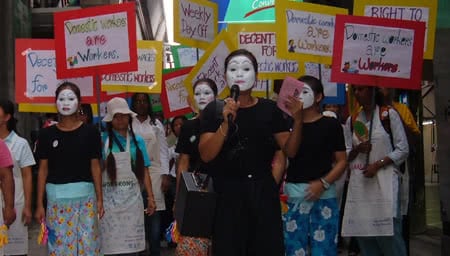Domestic workers provide essential services (e.g. cleaning, cooking, childcare, gardening) in other peoples' homes─which allows others to work outside the home. Thus domestic workers are an essential part of the labour market and the economy. The majority of the world's domestic work is performed by women, predominantly poor women. See Domestic Workers for more about the contributions, challenges and issues of domestic work around the world.
Legal Context

Because they work in private homes, domestic workers face unique vulnerabilities. Usually, there is a great social and economic power imbalance.
For migrant domestic workers, immigration status may be directly tied to their continued employment with a single employer. In many countries, domestic workers are excluded from social security and collective bargaining schemes. Furthermore, because domestic work happens in the home, generally out of the public eye, it is difficult to monitor and enforce laws protecting domestic workers' rights, even when they do exist. between the employer and the employee. The legal regulatory environment for domestic workers in most countries provides incomplete workplace protection. Domestic workers' hours are often poorly defined; many lack the right to live outside the home or even take their rest breaks outside of the home.
The resources on this site can help domestic workers and their organizations, as well as lawyers, researchers, advocates and policymakers understand some of the legal challenges around domestic work. Models for addressing those challenges can also be found here.

HIGHLIGHT: Convention on Decent Work for Domestic Workers (C189)
In 2011, after many years of advocacy and struggle on the part of domestic workers' unions and associations worldwide, the International Labour Conference adopted an international convention (C189). C189 recognizes the right of domestic workers to decent working conditions. These include the right to daily and weekly rest periods; a minimum wage and minimum age consistent with that of other sectors in each member country; the right to choose where to spend their leave and where to live; and the right to clear terms of employment. The Convention came into force after the second member state ratified it in 2013. Domestic workers are campaigning for individual countries to ratify and implement C189. See countries that have ratified C189.
For more information, read "Yes, We Did It!", Celia Mathers' account of how the Convention was achieved.
Resources
Publications
- Academic Bibliography on Law and Domestic Workers
- Other WIEGO Publications on Domestic Workers
- Your Toolkit on ILO Convention C189 — The Domestic Workers' Convention (by WIEGO and IDWF)
Laws on Domestic Work
- C189: Domestic Workers' Convention (ILO)
- Domestic Work Employees - Labor Standards (California, US)
- Hawaii (US) Domestic Workers' Bill of Rights
- ILO Fact Sheet on Domestic Workers' Rights in Brazil
- ILO Fact Sheet on Domestic Workers' Rights in Thailand
- New York (US) Domestic Workers' Bill of Rights
- South Africa Basic Conditions of Employment Act (Resource Guide for Domestic Workers and Employers)
- Summary of Legal Framework on Domestic Work in Peru
Legal Judgments on Domestic Work
Law Project Reports on Domestic Workers
- Report from Consultation with Domestic Workers in Ghana, 2011
- Report on Domestic Workers in Ghana, 2012
- Report on Peru, 2013 (multi-sector, including domestic workers)
- Report on Situation of Domestic Workers in Thailand, 2012
News on Domestic Work and the Law
- "Argentina Becomes 15th Country to Ratify ILO Convention 189 on Domestic Work" (AFL-CIO, 13 Dec. 2013)
- "New Minimum Wage for Domestic Workers" (TimesLive [South Africa], 22 Nov. 2013)
- "In Brazil, Domestic Worker Laws Rattle Middle Class Families" (The Globe and Mail, 21 Nov. 2013)
